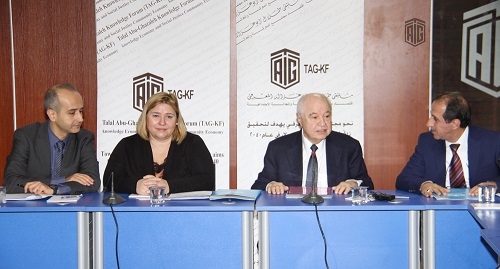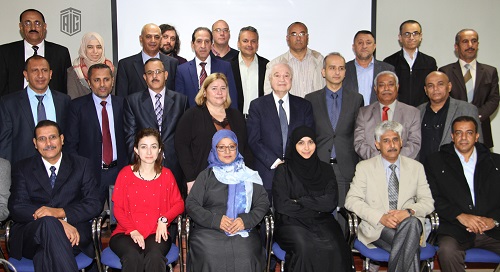Abu-Ghazaleh Highlights UN and EU Role, Stresses on Rebuilding Human Capacity in Yemen
29 Jan 2019AMMAN- HE Dr. Talal Abu-Ghazaleh, Chair of Consortium for Sustainable Urbanization (CSU) Honorary Council, and Co-Chair of UN-Habitat Network 11 expressed his pride in the role played by the United Nations and the European Union in supporting the refugees displaced around the world.
 Speaking at the opening of the "Rapid City and Neighborhood Profiling- Towards A Development Oriented Urban Recovery Process in Yemen" consultation meeting organized by UN-Habitat in cooperation with Talal Abu-Ghazaleh Organization (TAG-Org), Dr. Abu-Ghazaleh stated that Talal Abu-Ghazaleh Organization (TAG-Org) and UN-Habitat have cooperation and partnership agreement covering various fields.
Speaking at the opening of the "Rapid City and Neighborhood Profiling- Towards A Development Oriented Urban Recovery Process in Yemen" consultation meeting organized by UN-Habitat in cooperation with Talal Abu-Ghazaleh Organization (TAG-Org), Dr. Abu-Ghazaleh stated that Talal Abu-Ghazaleh Organization (TAG-Org) and UN-Habitat have cooperation and partnership agreement covering various fields.
"We are currently working on a comprehensive rebuilding plan in Syria, Yemen and Libya that will also support capacity building efforts of refugees themselves because we know that the Arab nation is a strong one and no matter what they face they will be able to stand up again. We have an office in Sanaa' and when it was hit we went and continued working from a hotel room; the Yemeni people are able to bounce back and overcome the challenges," he said.
 Dr. Abu-Ghazaleh who has been heavily involved in the ICT world for decades through his role as Chair of the UN ICT Task Force and the UN Global Alliance for ICT and Development in forging the millennium development goals thanked HE Ms. Maimunah Mohd Sharif, United Nations Under-Secretary-General and Executive Director of UN‐Habitat and HE Ms. Zena Ali-Ahmad, Director of UN-Habitat Regional Office for Arab States for her role in supporting the Arab world.
Dr. Abu-Ghazaleh who has been heavily involved in the ICT world for decades through his role as Chair of the UN ICT Task Force and the UN Global Alliance for ICT and Development in forging the millennium development goals thanked HE Ms. Maimunah Mohd Sharif, United Nations Under-Secretary-General and Executive Director of UN‐Habitat and HE Ms. Zena Ali-Ahmad, Director of UN-Habitat Regional Office for Arab States for her role in supporting the Arab world.
"The EU which we have great relations with in various projects has supported the Syrian refugees in Zaatari Camp and we today in partnership with the EU we provide education to those refugees in acquiring a university degree through our knowledge centers and we thank the EU for their positive role," he added.
Dr. Abu-Ghazaleh wished attendees representing public and private sectors in Yemen all the best during their meeting which was also attended by HE Ms. Antonia Calvo Puerta, EU Ambassador to Yemen.
"We need to work on three main tracks: the role of the government, the global organizations and the public–private partnership (PPP). In Yemen, the private sector is very creative and developed and they own the needed technology to match the best in Europe but there should be an entity or a ministry under the name of the Sustainable Rebuilding Commission (SRC) that is needed to organize all issues to plan the future and not only rebuilding what was destroyed; rebuilding human capacity is more important," he said.
"I hope the UN will listen and plan in Yemen a program similar to the one in Zaatari Camp to teach online to support refugees and I am ready to provide an Internet line and knowledge stations to help in this program," he added.
The one-day meeting focused on Yemen crisis and the impact of the conflict which is mainly urban and even though key cities have faced different levels of destruction, secondary and tertiary cities have become ports for reverse population movement transforming them into hosting areas for internally displaced persons (IDPs).





